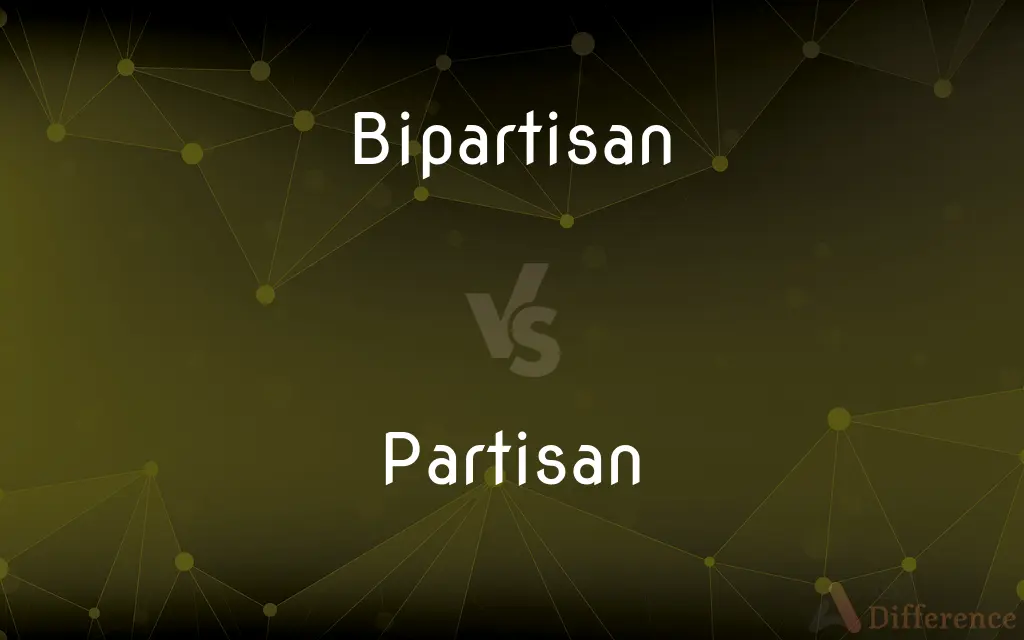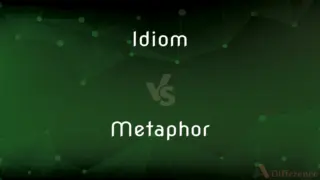Bipartisan vs. Partisan — What's the Difference?
By Tayyaba Rehman — Updated on November 1, 2023
Bipartisan refers to cooperation between two political parties, emphasizing collaboration. Partisan pertains to strong support for one's own party or cause, often without consideration for other views.

Difference Between Bipartisan and Partisan
Table of Contents
ADVERTISEMENT
Key Differences
Bipartisan typically describes actions or policies that gain support from members of both major political parties. It embodies the spirit of cooperation, suggesting that people from diverse political backgrounds can find common ground. Partisan, on the other hand, suggests allegiance to a specific political party or cause, often to the point of being unwilling to compromise with or even consider opposing viewpoints.
In a polarized political environment, bipartisan efforts are often lauded as they show a willingness to bridge divides for the greater good. Such initiatives, whether they be legislation or simple gestures, are seen as beneficial for promoting unity. In contrast, partisan actions or rhetoric emphasize division, underlining a firm stance for one party's principles, sometimes at the expense of broader cooperation.
While bipartisan approaches are celebrated for their inclusive nature, it's worth noting that they don't necessarily denote universal agreement or the absence of robust debate. They simply indicate that members from both sides can ultimately agree. Partisan positions, meanwhile, can be deeply entrenched, driven by a strong belief in the righteousness of one's own party or cause, and can sometimes impede the legislative process.
It's essential to understand that neither bipartisan nor partisan is inherently good or bad. Bipartisan actions might lead to compromise and collaboration, while partisan activities can reflect deep-rooted convictions. What's vital is the context in which these terms are used and the outcomes they produce.
In a broader context, while bipartisan indicates a crossing of party lines, partisan activities or views stand firmly within those lines, advocating fiercely for them without a need for cross-party validation.
ADVERTISEMENT
Comparison Chart
Primary Definition
Cooperation between two parties
Strong support for a party or cause
Nature
Collaborative
Allegiant
Depiction in Politics
Bridge-building
Division-promoting
Stance
Open to compromise
Often entrenched and unwavering
Scope in Decision-making
Inclusive, seeks agreement
May disregard opposing views
Compare with Definitions
Bipartisan
Involving the agreement of two political parties.
The bill passed with bipartisan support in Congress.
Partisan
Relating to or characteristic of party loyalty.
Partisan politics often hinder productive dialogue.
Bipartisan
Transcending party lines for decision-making.
The mayor's bipartisan approach fostered city-wide unity.
Partisan
A strong supporter of a party or cause.
The partisan crowd cheered loudly for their candidate.
Bipartisan
Bridging political divides for common goals.
The bipartisan effort led to the creation of the welfare program.
Partisan
Biased in favor of a particular side.
The article was criticized for its partisan tone.
Bipartisan
Representing unity among major parties.
The bipartisan committee worked diligently on the proposal.
Partisan
Displaying extreme allegiance to a specific group.
Her views were deemed overly partisan by many.
Bipartisan
Of or relating to both sides of a political spectrum.
The senator's bipartisan stance was appreciated by all.
Partisan
Militant or fervent supporter of a cause.
Partisans of the movement rallied in the city square.
Bipartisan
Of, consisting of, or supported by members of two parties, especially two major political parties
A bipartisan resolution.
Partisan
A fervent, sometimes militant supporter or proponent of a party, cause, faction, person, or idea.
Bipartisan
(politics) Relating to, or supported by two groups, especially by two political parties.
A bipartisan bill
Partisan
A member of an organized body of fighters who attack or harass an enemy, especially within occupied territory; a guerrilla.
Bipartisan
Supported by both sides;
A two-way treaty
Partisan
A weapon having a blade with lateral projections mounted on the end of a long shaft, used chiefly in the 1500s and 1600s.
Partisan
Of, relating to, or characteristic of a partisan or partisans.
Partisan
Biased in support of a party, group, or cause
Partisan politics.
Partisan
An adherent to a party or faction.
Partisan
A fervent, sometimes militant, supporter or proponent of a party, cause, faction, person, or idea.
Partisan
A member of a band of detached light, irregular troops acting behind occupying enemy lines in the ways of harassment or sabotage; a guerrilla fighter.
Partisan
The commander of a body of detached light troops engaged in making forays and harassing an enemy.
Partisan
(historical) A long-handled spear with a triangular, double-edged blade having lateral projections, in some forms also used in boar hunting.
Partisan
(obsolete) A soldier armed with such a weapon.
Partisan
Serving as commander or member of a body of detached light troops.
Partisan officer, partisan corps
Partisan
Adherent to a party or faction; especially, having the character of blind, passionate, or unreasonable adherence to a party.
They were blinded by partisan zeal.
Partisan
Devoted to or biased in support of a party, group, or cause.
Partisan politics
Partisan
An adherent to a party or faction; esp., one who is strongly and passionately devoted to a party or an interest.
Both sides had their partisans in the colony.
Partisan
The commander of a body of detached light troops engaged in making forays and harassing an enemy.
Partisan
A kind of halberd or pike; also, a truncheon; a staff.
And make him with our pikes and partisans a grave.
Partisan
Adherent to a party or faction; especially, having the character of blind, passionate, or unreasonable adherence to a party; as, blinded by partisan zeal.
Partisan
Serving as a partisan in a detached command; as, a partisan officer or corps.
Partisan
A fervent and even militant proponent of something
Partisan
An ardent and enthusiastic supporter of some person or activity
Partisan
A pike with a long tapering double-edged blade with lateral projections; 16th and 17th centuries
Partisan
Devoted to a cause or party
Partisan
Adhering or confined to a particular sect or denomination or party;
Denominational prejudice
Common Curiosities
What does Bipartisan mainly signify?
Bipartisan signifies cooperation and agreement between two major parties.
Is Partisan about supporting a single political party?
Yes, Partisan indicates strong allegiance to one's party or cause.
Are all collaborative efforts Bipartisan?
Not necessarily. Bipartisan specifically implies collaboration between two major political parties.
Does Bipartisan mean neutral?
Not necessarily. It indicates cooperation between parties, not a lack of stance.
What drives Partisan viewpoints?
Deep-rooted beliefs, party loyalty, or personal convictions can shape Partisan views.
What's an example of Bipartisan action in politics?
Passing legislation with significant votes from both major parties is Bipartisan.
Can an individual be described as Partisan?
Yes, if they strongly support a party or cause without considering other views.
Can a policy be both Bipartisan and controversial?
Yes, being Bipartisan means it has cross-party support, not universal agreement.
Does Partisan always indicate negativity?
No, it merely shows strong support; its positive or negative connotation depends on context.
Is Partisan linked to bias?
Often, yes. Partisan views can be biased towards one's party or cause.
Can a Bipartisan effort still fail?
Yes, Bipartisan support doesn't guarantee success, just cross-party agreement.
Does Bipartisan always involve only two parties?
Typically, yes, especially in contexts with two dominant parties.
Are media outlets accused of Partisan reporting?
Yes, some media outlets are criticized for presenting news with a Partisan slant.
Why is Partisanship often criticized?
Extreme Partisanship can hinder compromise and productive dialogue.
Is Bipartisan consensus always beneficial?
Generally, it's seen positively, but the outcome's benefit can vary based on the issue.
Share Your Discovery

Previous Comparison
Idiom vs. Metaphor
Next Comparison
Cornpone vs. JohnnycakeAuthor Spotlight
Written by
Tayyaba RehmanTayyaba Rehman is a distinguished writer, currently serving as a primary contributor to askdifference.com. As a researcher in semantics and etymology, Tayyaba's passion for the complexity of languages and their distinctions has found a perfect home on the platform. Tayyaba delves into the intricacies of language, distinguishing between commonly confused words and phrases, thereby providing clarity for readers worldwide.














































